
Siouxsie and the Banshees were a British rock band formed in London in 1976 by vocalist Siouxsie Sioux and bass guitarist Steven Severin. They have been widely influential, both over their contemporaries and with later acts. Q magazine included John McKay's guitar playing on "Hong Kong Garden" in their list of "100 Greatest Guitar Tracks Ever", while Mojo rated guitarist John McGeoch in their list of "100 Greatest Guitarists of All Time" for his work on "Spellbound". The Times called the group “one of the most audacious and uncompromising musical adventurers of the post-punk era".

Public Image Ltd are an English post-punk band formed by singer John Lydon, guitarist Keith Levene, bassist Jah Wobble, and drummer Jim Walker in 1978. The group's personnel has changed frequently over the years; Lydon has been the sole constant member.

Magazine were an English rock band formed in 1977 in Manchester in England by singer Howard Devoto and guitarist John McGeoch. After leaving the punk group Buzzcocks in early 1977, Devoto decided to create a more progressive and less "traditional" rock band. The original lineup of Magazine was composed of Devoto, McGeoch, Barry Adamson on bass, Bob Dickinson on keyboards and Martin Jackson on drums.

Metal Box is the second studio album by Public Image Ltd, released by Virgin Records on 23 November 1979. The album takes its name from the round metal canister which contained the initial pressings of the record. It was later reissued in standard vinyl packaging as Second Edition in February 1980 by Virgin Records in the United Kingdom, and by Warner Bros. Records and Island Records in the United States.
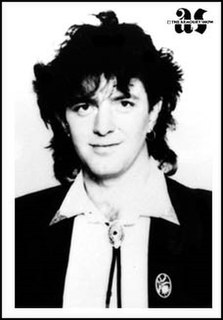
John Alexander McGeoch was a Scottish musician and songwriter. He is best known as the guitarist of the rock bands Magazine (1977-1980) and Siouxsie and the Banshees (1980-1982).
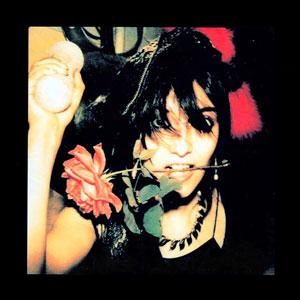
The Flowers of Romance is the third studio album by English experimental rock band Public Image Ltd, released on 10 April 1981 by record label Virgin.

Public Image: First Issue is the debut studio album by English rock band Public Image Ltd, released in 1978 by record label Virgin.

Happy? is the sixth studio album by English rock band Public Image Ltd, released in 1987.

Album is the fifth album by the English rock band Public Image Ltd, released on 27 January 1986. In a departure from their previous releases, John Lydon was advised by trusted music producer Bill Laswell to take on an all-star cast of session and trusted musicians, including Steve Vai, Ryuichi Sakamoto, Tony Williams and Ginger Baker. The resulting album gave PiL one of its highest charting songs, "Rise".
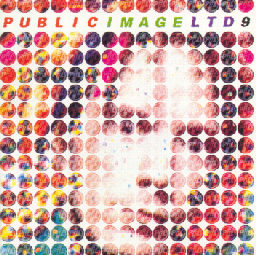
9 is the seventh studio album by Public Image Ltd, but their ninth full-length release including the live albums Paris au Printemps and Live in Tokyo. It was released in May 1989 on the Virgin Records label.
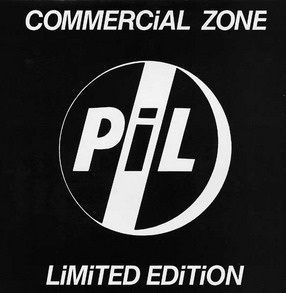
Commercial Zone is an album of studio recordings by Public Image Ltd., recorded in 1982 and 1983, and released in 1984 by PiL founding guitarist Keith Levene. Commercial Zone includes five songs that were later re-recorded for PiL's fourth official studio album, This Is What You Want... This Is What You Get (1984) – for this reason, Commercial Zone is often considered to be an earlier/alternative version of that album.

This Is What You Want... This Is What You Get is a 1984 album by Public Image Ltd. It is the band's fourth official studio album and includes the single "Bad Life" and a re-recorded version of a "This Is Not a Love Song", which had been a No. 5 UK and international hit when released as a single in 1983. An early version of the album was released in 1984 by founding PiL guitarist Keith Levene as Commercial Zone. The album was then re-recorded after Levene's departure from the band, with no contributions from either Levene or bassist Pete R. Jones.

That What Is Not is the eighth studio album by Public Image Ltd, released in 1992. It was the band's final album before a 20-year hiatus, and the final recordings with longtime members Allan Dias (bass) and John McGeoch.

The Greatest Hits, So Far is a greatest hits album by English post-punk band Public Image Ltd, released in 1990 by record label Virgin. It compiles all of the band's singles from 1978 to 1990 and features a new track, "Don't Ask Me", which was released as a single, reaching number 22 the UK and number 2 on the US Modern Rock chart. "This Is Not a Love Song" is not represented in its original single form, but as the remake from This Is What You Want... This Is What You Get. The album's artwork is by notable New Zealand-born artist and musician Reg Mombassa.
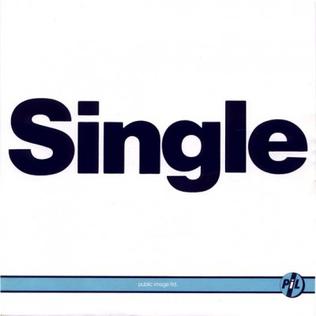
"Rise" is a single released by post-punk group Public Image Ltd in 1986. It was the first single from Album, their fifth studio album.
Russell Webb is a Scottish new wave bass guitarist who was member of bands such as Slik, PVC2, Zones, Skids, The Armoury Show and Public Image Ltd and collaborated with Richard Jobson, Virginia Astley and The Who.
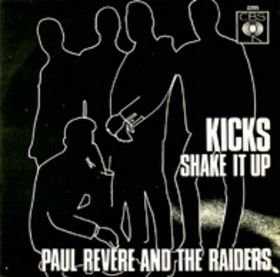
"Kicks" is a song composed by Barry Mann and Cynthia Weil, best known as a 1966 hit for American rock band Paul Revere & the Raiders.

John Joseph Lydon, also known by his stage name Johnny Rotten, is an English singer and songwriter. He was the lead singer of the late-1970s British punk band the Sex Pistols, which lasted from 1975 until 1978, and again for various revivals during the 1990s and 2000s. He is also the lead singer of post-punk band Public Image Ltd (PiL), which he founded and fronted from 1978 until 1993, and again since 2009.

"Public Image" is the debut single by Public Image Ltd. It reached number nine on the UK Singles Chart. The lyrics were written when band co-founder John Lydon was a member of the Sex Pistols. The song addresses Lydon's feelings of being exploited in the Sex Pistols by Malcolm McLaren and the press. Along with being released as a single, it appeared on PiL's 1978 debut album Public Image: First Issue.


















